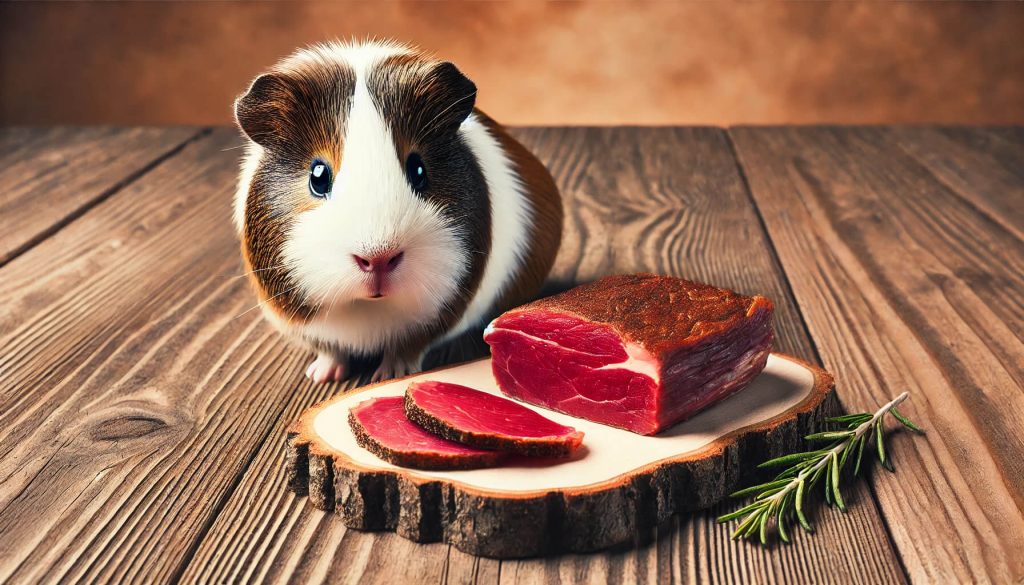
Can Guinea Pigs Eat Venison?
Understanding Guinea Pig Dietary Needs
Guinea pigs require a specialized diet to stay healthy and thrive. They’re herbivores with particular nutritional needs.
What Guinea Pigs Normally Eat
Guinea pigs primarily eat hay, which should make up approximately 80% of their diet. Timothy hay is a popular choice. Fresh vegetables like bell peppers, carrots, and cucumbers offer essential vitamins and minerals. Leafy greens like romaine lettuce and parsley are also beneficial. Commercial guinea pig pellets can supplement their diet, ensuring they receive adequate nutrients such as vitamin C, which is crucial as they can’t produce it.
Nutritional Requirements for Guinea Pigs
Guinea pigs have specific dietary requirements. They need high fiber intake from hay to maintain proper digestion and oral health. Adequate vitamin C is essential to prevent scurvy; you can provide it through fresh vegetables and fortified pellets. Fat and protein from plant-based sources ensure they get balanced nutrition. Fresh water should always be available, using a sipper bottle to keep it uncontaminated.
By adhering to these guidelines, you’ll ensure your guinea pig enjoys a healthy, balanced diet that meets all their nutritional needs.
Can Guinea Pigs Eat Venison?
Guinea pigs’ dietary needs differ greatly from carnivorous animals. It’s essential to understand what foods are appropriate for your pet to avoid health issues.
Exploring the Safety of Venison for Guinea Pigs
Guinea pigs can’t eat venison. Their digestive systems are designed for plant-based foods, not meat or any animal products. Introducing venison to a guinea pig’s diet can lead to serious health problems like digestive upset, liver issues, and even death. Always stick to their natural plant-based diet comprising hay, vegetables, and specifically formulated pellets.
Potential Health Benefits and Risks
No health benefits exist for guinea pigs eating venison. Instead, feeding them meat can result in multiple health risks, including severe gastrointestinal distress, nutrient imbalances, and organ damage. Guinea pigs require high fiber, vitamin C, and plant-based protein. Hay and vegetables fulfill these needs.
To keep your guinea pig healthy, adhere to a diet suited to their herbivorous nature. This ensures they receive the necessary nutrients without exposing them to harmful foods like venison.
Alternative Safe Foods for Guinea Pigs
Providing a balanced diet for your guinea pig means selecting appropriate foods that cater to their specific dietary needs. Below are some recommendations and cautions for feeding your pet.
Recommended Foods for Optimal Health
Ensure your guinea pig’s diet includes a variety of nutrient-rich foods:
- Hay: Timothy hay is essential for guinea pigs. It aids digestion, prevents dental issues, and should make up most of their diet.
- Vegetables: Offer leafy greens like romaine lettuce, kale, and spinach in moderation. Bell peppers and carrots are also good choices.
- Fruits: Feed fruits like apples, strawberries, and blueberries sparingly due to their sugar content.
- Pellets: Use commercial guinea pig pellets fortified with vitamin C. Ensure they don’t contain seeds, nuts, or dried fruit.
Foods to Avoid in a Guinea Pig’s Diet
Avoid feeding your guinea pig the following foods to prevent health problems:
- Meat and Dairy: Guinea pigs are herbivores; meat products like venison and dairy items can cause digestive issues and nutrient imbalances.
- High-Sugar Foods: Avoid treats like chocolate, candy, and sugary snacks that can lead to obesity and dental problems.
- Certain Vegetables and Fruits: Foods like onions, garlic, and avocado can be toxic. Limit high-oxalate vegetables like spinach to prevent urinary issues.
- Processed Human Foods: Chips, bread, and cereals are inappropriate for guinea pigs and can lead to health issues.
Adhering to these dietary guidelines ensures your guinea pig remains healthy and happy.
Conclusion
Ensuring your guinea pig’s diet is rich in fiber and vitamin C is essential for their health. Avoid feeding them venison or any meat products, as their digestive systems are designed for plant-based foods. Stick to safe options like hay, vegetables, fruits, and vitamin C-fortified pellets. By following these dietary guidelines, you’ll help keep your guinea pig healthy and happy.
